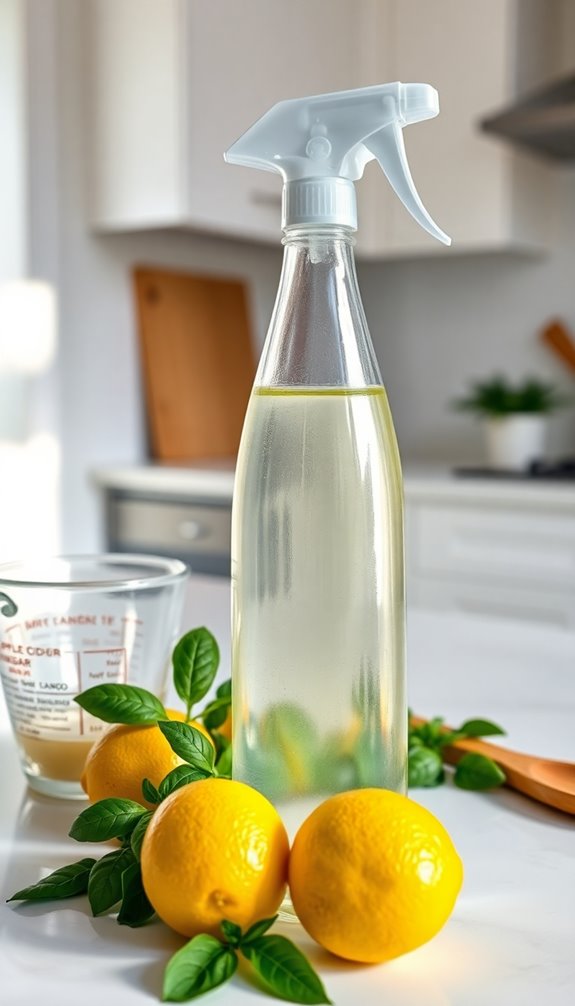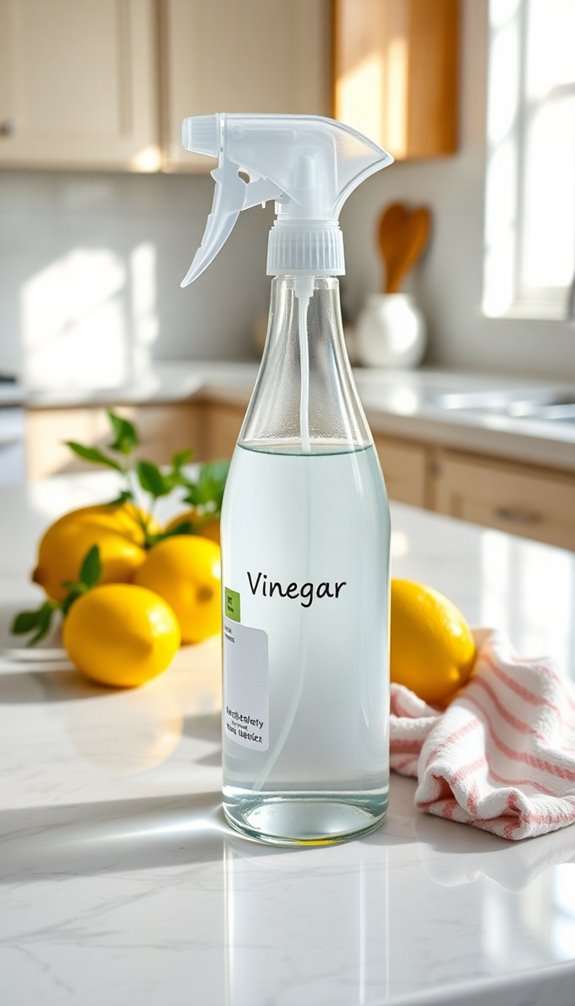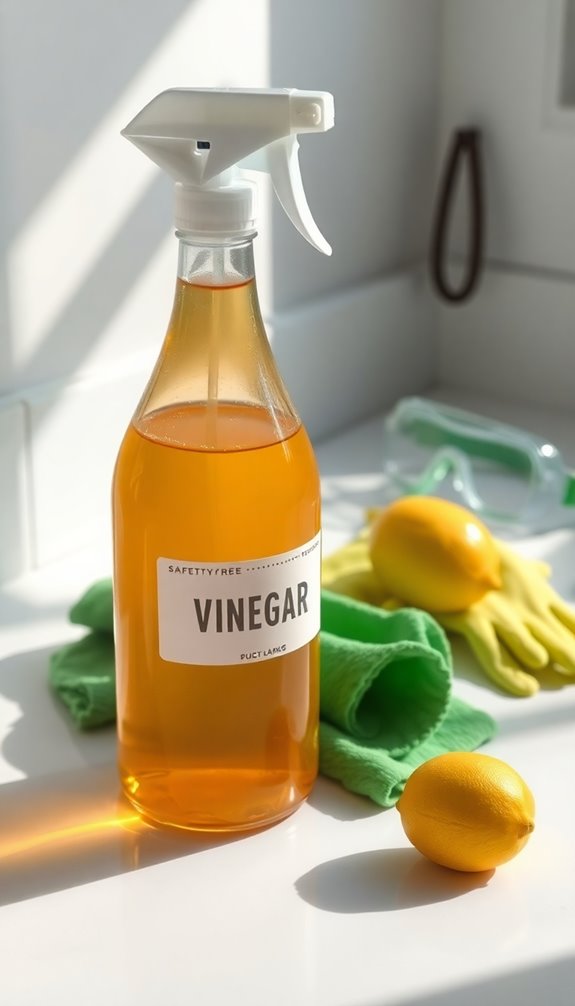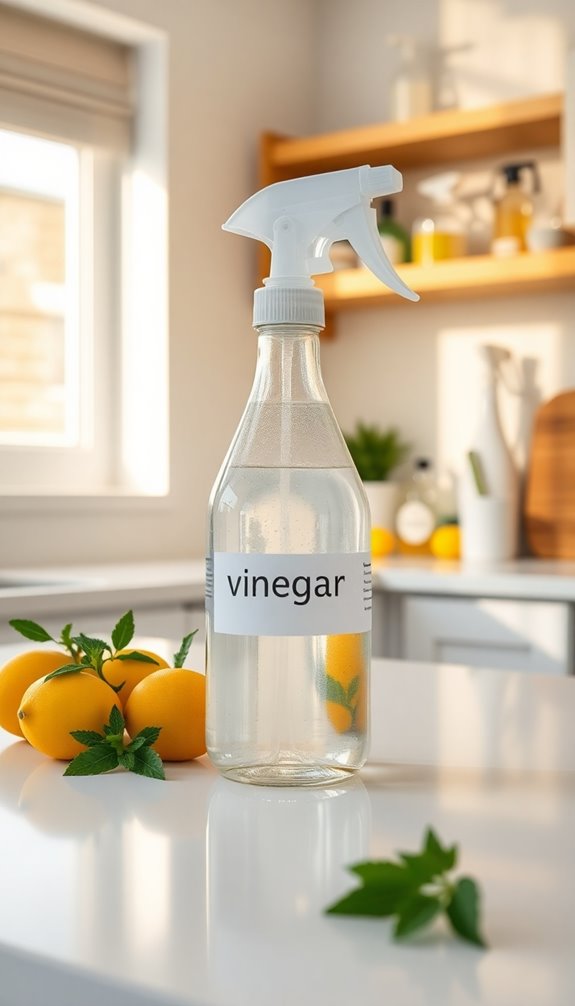To make a vinegar cleaning spray, mix equal parts distilled white vinegar and distilled water in a 16 oz glass spray bottle. Optionally, add essential oils or lemon zest for extra antibacterial properties and a fresh scent. This simple solution cuts through grease and stains while being eco-friendly and safe for your home. Spray it on surfaces like countertops and glass, let it sit for 5-10 minutes, then wipe with a microfiber cloth for a streak-free shine. Just remember to avoid natural stone and electronics. Stick around to uncover more tips for effective cleaning with vinegar!
Benefits of Vinegar as a Cleaner
When it comes to household cleaning solutions, vinegar is a powerhouse. With its 4-6% acetic acid content, it cuts through grease, removes stains, and neutralizes odors effectively, making it an ideal choice for your DIY cleaning endeavors. Its disinfectant properties are backed by studies, proving it can sanitize surfaces without harsh chemicals. This means you can keep your home clean and safe without exposing your family to unnecessary toxins. Additionally, using natural cleaning solutions can help further reduce chemical exposure in your home.
Using vinegar as a cleaner is also an affordable alternative to commercial products. You only need vinegar and water to create an effective cleaning solution, helping you save money while keeping your space spotless. Additionally, using natural cleaning ingredients like baking soda alongside vinegar can enhance its cleaning abilities.
Plus, vinegar is environmentally friendly; it breaks down naturally and won't contribute to the pollution linked with many chemical cleaners. Additionally, its effectiveness as a cleaner is enhanced by natural ingredients like essential oils for added antibacterial properties.
This versatile cleaner works wonders on various surfaces, including stainless steel appliances, countertops, and windows. However, it's wise to avoid using it on stone surfaces like granite and marble.
Ingredients for Your Cleaner
To create an effective vinegar cleaning spray, you'll need just a couple of essential ingredients: distilled white vinegar and water. Vinegar's acidic nature effectively breaks down soap scum and mineral deposits, making it a powerful cleaning agent. You can also enhance your cleaner with optional additions like lemon zest or essential oils for a more pleasant scent. These ingredients not only boost the fragrance but also maintain the spray's cleaning power. Additionally, using a vinegar and water solution is effective for tackling soap scum and mineral deposits. Regular use of this cleaner supports sustainable practices for a healthier home environment.
Essential Ingredients Overview
Creating an effective vinegar cleaning spray requires just a few essential ingredients. You'll find that making this natural cleaner is simple and straightforward. Here's what you need:
- Distilled White Vinegar: This is the star of your cleaning spray, containing 4-6% acetic acid, which helps break down grime and disinfect surfaces.
- Water: Mix the distilled white vinegar with water in a 1:1 ratio for general cleaning tasks. Using distilled water is best for longer storage.
- Essential Oils: Though optional, adding oils like lavender or lemon can enhance the scent and provide antibacterial properties.
- Baking Soda: For tougher stains, consider using full-strength vinegar or mixing vinegar with baking soda for a natural abrasive cleaner.
For a touch of freshness, you can also infuse your vinegar solution with lemon zest strips or fresh herbs like rosemary during preparation.
These ingredients work together to create a powerful cleaning spray that's safe for your home and the environment. Enjoy the benefits of a chemical-free clean with this simple vinegar solution!
Optional Additions Benefits
You might be surprised at how a few optional additions can elevate your vinegar cleaning spray. Adding lemon zest strips or fresh rosemary sprigs not only enhances the scent but also boosts antibacterial properties thanks to their natural compounds. Essential oils, like lavender or lemongrass, can create a pleasant aroma while improving the spray's antibacterial effectiveness.
Incorporating citrus peels, such as from lemons or oranges, increases the cleaning power of your vinegar for cleaning. The natural acids and oils in the peels work wonders against grime.
If you're tackling tough stains, mixing in baking soda creates a natural abrasive that scrubs away dirt while deodorizing your surfaces.
For those seeking a more robust cleaner, consider using cleaning vinegar. It has a higher acidity (6% compared to the usual 5% in regular white vinegar), making it even more effective against stubborn stains.
These optional additions not only improve the scent and cleaning power but also guarantee you're using a safe, chemical-free solution. With these enhancements, your vinegar cleaning spray becomes an even more potent ally in maintaining a clean home.
Preparation Steps

Preparing a vinegar cleaning spray is a straightforward process that yields an effective cleaning solution. You'll only need a few simple ingredients and a bit of time to create your homemade vinegar cleaner. Here's how to do it:
- Gather your ingredients: You'll need 8 oz of distilled white vinegar and 8 oz of distilled water. This simple recipe is a budget-friendly alternative to commercial cleaners and supports eco-friendly practices by using natural ingredients.
- Select a spray bottle: Use a 16 oz glass spray bottle for storing your mixture. Glass is preferable, as it's more durable and won't react with the vinegar.
- Mix the ingredients: Pour the distilled vinegar and distilled water into the spray bottle. This 1:1 ratio is perfect for general cleaning.
- Enhance (optional): If you want to add a pleasant scent, consider mixing in lemon zest strips or fresh rosemary sprigs. Essential oils like lavender or lemongrass also work great! These additions can provide a more enjoyable cleaning experience, similar to using eco-friendly cleaners that come in various pleasant scents.
After you've combined everything, shake the bottle well before each use to guarantee proper blending. Additionally, this vinegar-based solution not only disinfects but also effectively breaks down grease and grime, making it suitable for various kitchen surfaces.
Remember to store your vinegar cleaner in a cool, dry place away from direct sunlight to maintain its effectiveness. Happy cleaning!
Application Techniques
When you're ready to use your vinegar cleaning spray, applying it correctly makes all the difference.
Different surfaces require specific techniques to maximize effectiveness, so you'll want to adjust your approach accordingly.
Let's explore the best methods for applying your vinegar solution to achieve ideal results. Additionally, remember that vinegar can also be used as a natural fabric softener in laundry, enhancing your cleaning routine.
Surface-Specific Application Methods
Cleaning various surfaces with vinegar requires specific techniques to maximize effectiveness and achieve the finest results. Here's how to use vinegar for different areas in your home:
- Stainless Steel Appliances: Spray the vinegar cleaner directly onto the surface. Use a microfiber cloth to wipe and buff, achieving a streak-free shine.
- Greasy Stove Tops: Spritz the vinegar solution and let it sit for 5-10 minutes to penetrate the grease. Wipe away with a sponge or cloth to guarantee effective removal.
- Sinks and Tile Counters: Apply the vinegar cleaner with a sponge or soft bristle brush. Gently scrub to lift grime, then rinse with water for a fresh finish.
- Cloudy Glasses and Dirty Windows: Spray the vinegar solution and let it sit briefly. Wipe with a lint-free cloth or newspaper; the smell disappears, leaving ideal clarity and shine.
Optimal Spray Techniques
To achieve the best results with your vinegar cleaning spray, understanding ideal application techniques is key.
Start by spraying the cleaner with vinegar from a distance of about 6-12 inches. This guarantees even coverage without oversaturating the surface, which can lead to streaks or excess moisture. For tough stains or build-up, don't forget to let it sit for 5-10 minutes after application. This waiting period enhances the vinegar's effectiveness in breaking down grime.
When it's time to wipe, use a microfiber cloth or a soft sponge. These materials are gentle on surfaces and help effectively remove dirt without scratching.
For vertical surfaces, like shower walls or windows, spray from the bottom up. This technique helps prevent drips, guaranteeing a cleaner application.
After you've scrubbed and wiped down the area, always follow up with a damp cloth or rinse the surface. This step removes any remaining vinegar residue, leaving you with a streak-free finish.
Practice these ideal spray techniques, and you'll enjoy a clean, chemical-free environment!
Effective Surfaces to Clean

Vinegar cleaning spray is a powerhouse for tackling a variety of surfaces in your home. This versatile solution not only promotes a chemical-free clean but also effectively tackles tough messes.
Here are some of the best surfaces to clean with vinegar:
- Stainless Steel Appliances: Use a microfiber cloth to buff away stains and restore that shiny finish.
- Greasy Stove Tops: Spray and let the solution sit for 5-10 minutes; then wipe away the grease effortlessly.
- Sinks and Tile Counters: Grab a sponge or soft bristle brush to scrub away grime without harsh chemicals.
- Glass Spray: For cloudy glasses and dirty windows, vinegar cleaning leaves surfaces clear and streak-free after a quick wipe.
Additionally, vinegar spray works wonders on trash cans, cleaning and deodorizing them effectively.
While it's great for many surfaces, remember to test a small area first, especially on hardwood floors, to verify compatibility.
With these tips, you can harness the full potential of vinegar cleaning spray for a sparkling, fresh home.
Surfaces to Avoid
While vinegar cleaning spray is effective on many surfaces, there are significant ones you should steer clear of.
First, natural stone surfaces like granite and marble can suffer damage from vinegar's acidic nature, leading to etching and dullness. You should also avoid using vinegar on unfinished wood, as it can be absorbed, causing swelling or cracking that ruins the finish.
When it comes to electronics, keep vinegar away from screens and coated surfaces. The acidity can harm these delicate components, leading to costly repairs.
Additionally, never mix vinegar with bleach; doing so creates harmful chlorine gas, putting your health at risk.
Lastly, be cautious with your cast iron cookware. Using vinegar on these surfaces can strip away the seasoning, which is necessary for maintaining their non-stick properties.
To guarantee your cleaning efforts are effective and safe, it's vital to identify these surfaces and find alternative cleaning methods. By avoiding these specific areas, you'll protect your belongings from damage while still enjoying the benefits of natural vinegar cleaning in other parts of your home.
Safety Precautions

When using vinegar cleaning spray, always make sure you're in a well-ventilated area to avoid inhaling any fumes.
Never mix vinegar with other cleaners like bleach or ammonia, as this can create dangerous gases.
Additionally, store your vinegar solutions safely out of reach of children and pets to prevent any accidents.
Mixing Precautions
To keep your cleaning safe, be cautious about what you mix with vinegar. Certain combinations can be dangerous and should be strictly avoided. Here are some essential mixing precautions to keep in mind:
- Avoid mixing vinegar with bleach: This creates toxic chloramine vapors, which can harm your respiratory system.
- Steer clear of ammonia: Mixing vinegar with ammonia produces harmful gases that can irritate your eyes and throat.
- Don't combine with hydrogen peroxide: This mixture can create peracetic acid, a dangerous substance that can cause skin and eye irritation.
- Always conduct a patch test: Before using vinegar on new surfaces, apply it to an inconspicuous area to verify it won't cause damage or discoloration.
Additionally, store your vinegar cleaning solutions in a cool, dry place, away from sunlight, to maintain their effectiveness.
If you have sensitive skin, consider wearing gloves while handling vinegar to prevent irritation.
Finally, keep all cleaning solutions out of reach of children and pets to avoid accidental ingestion or misuse.
Staying mindful of these precautions will help guarantee a safe and effective cleaning experience.
Ventilation Requirements
Using vinegar for cleaning can be effective, but it's important to take into account ventilation requirements to secure your safety.
Always work in a well-ventilated area to minimize inhalation of strong odors and potential irritation. Open windows and doors or use fans to promote air circulation while you clean with vinegar. This helps disperse any lingering fumes and enhances your overall safety.
Avoid using vinegar on surfaces near heat sources or in enclosed spaces, as fumes can accumulate and pose respiratory issues. If you're mixing vinegar with other cleaning agents, such as bleach, make sure the area is well-ventilated to prevent harmful reactions.
If you're sensitive to strong smells or already have respiratory issues, consider wearing a mask during your cleaning sessions. This additional precaution can help protect you from irritation and secure a more comfortable cleaning experience.
Storage Guidelines
Proper storage of vinegar cleaning solutions is essential for maintaining their effectiveness and guaranteeing safety. To keep your cleaning solutions in peak condition, follow these storage guidelines:
- Use amber or dark-colored bottles: This protects your solutions from light, which can degrade their quality over time.
- Store in a cool, dry place: Keep your vinegar cleaning solutions away from direct sunlight to prevent ingredient degradation.
- Label clearly: Always label your homemade cleaning solutions to prevent misuse and guarantee proper handling.
- Keep out of reach: Store vinegar and cleaning solutions where children and pets can't access them, avoiding accidental ingestion or exposure.
Additionally, guarantee proper ventilation when you're using vinegar cleaners. This helps reduce the inhalation of strong odors and enhances safety during your cleaning tasks.
By following these guidelines, you'll not only maintain the effectiveness of your vinegar cleaning solutions but also guarantee a safer environment for everyone in your home.
Eco-Friendly Advantages
Embracing vinegar as a cleaning solution brings a host of eco-friendly advantages that benefit both your home and the planet.
First off, vinegar serves as an affordable alternative to commercial cleaning products, helping you reduce reliance on harsh chemicals that can harm the environment. With its 4-6% acetic acid, vinegar effectively cuts through grease, neutralizes odors, and exhibits antibacterial properties, making it a versatile option for all your cleaning needs.
By opting for vinegar, you also minimize plastic waste associated with single-use cleaning products. You can easily make your own cleaning solution at home and store it in reusable containers.
Plus, vinegar cleaning solutions are biodegradable, ensuring they won't contribute to water pollution or leave harmful residues behind after use.
Another significant advantage of using vinegar is its positive impact on indoor air quality. Unlike conventional cleaning agents, vinegar doesn't release toxic fumes, allowing you to breathe easier and create a healthier living environment.
Storage Recommendations

When it comes to keeping your vinegar cleaning solution effective, storage plays a key role. Proper storage guarantees that your solution remains potent and ready for use whenever you need it.
Here are some essential recommendations for storing your vinegar cleaning spray:
- Use a Glass Bottle: Opt for a glass spray bottle instead of plastic. Glass is less reactive, which helps preserve the solution's potency over time.
- Keep it Cool and Dry: Store your cleaning solution in a cool, dry place, away from direct sunlight. This prevents degradation and maintains its effectiveness.
- Label Clearly: Make sure to label the bottle clearly. This helps you and others identify the solution easily, avoiding any potential misuse.
- Consider Distilled Water: If you're making a long-term batch, use distilled water in your cleaning solution. This reduces the risk of bacterial growth and keeps your vinegar solution pure.
Additionally, regularly check your solution for any changes in smell or appearance. If you notice any signs of contamination or degradation, it's best to replace it to guarantee safe and effective cleaning.
Community Engagement Ideas
Engaging with your community can enhance your vinegar cleaning spray experience and inspire others to adopt eco-friendly cleaning habits. Start by encouraging your followers to share their DIY vinegar cleaning spray results on social media. Ask them to tag your account and use a designated hashtag to foster interaction and idea exchange.
Next, consider hosting a virtual cleaning challenge where participants can post before-and-after photos of spaces cleaned with vinegar spray. This promotes engagement and friendly competition while showcasing the effectiveness of your favorite non-toxic solution.
Create polls or questionnaires on social media to gather feedback about favorite vinegar cleaning tips or recipes. This allows your community to contribute insights and preferences, making everyone feel involved.
Don't forget to share user-generated content! Feature community members' cleaning hacks or experiences with vinegar sprays in your posts or stories to highlight the benefits of these DIY solutions.
Conclusion
You've learned how easy and effective vinegar cleaning spray can be for a chemical-free clean. You might worry it won't tackle tough grime like commercial cleaners, but remember, vinegar's natural acidity breaks down dirt and disinfects without harmful toxins. By choosing this eco-friendly alternative, you're not just cleaning your home; you're also protecting your family and the planet. So grab that bottle of vinegar and take pride in making a healthier choice for your loved ones!